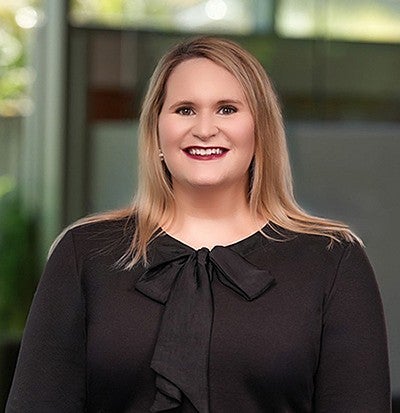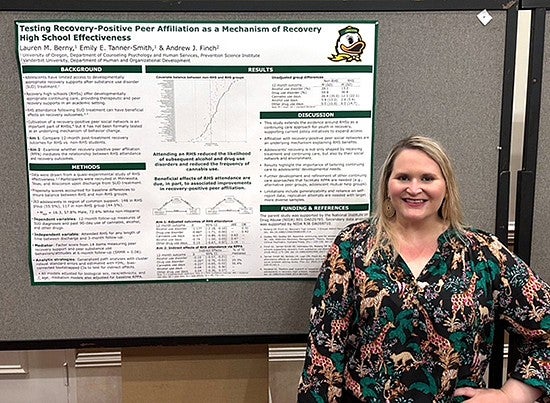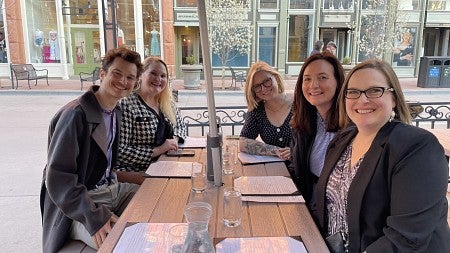
Learn more about Lauren Berny, a doctoral student graduating from our Prevention Science program, through our Graduate Spotlight series.
"The College of Education faculty are kind and invested mentors, and the students create a collaborative and uplifting environment. It is an environment that truly supports both personal well-being and academic growth." –Lauren Berny
Meet Lauren Berny! Lauren is from Boardman, Ohio and will be graduating from our Prevention Science PhD program with specializations in Data Science and Quantitative Research Methods.
Lauren is an exceptional researcher. During her time as a doctoral student, she received a prestigious R36 dissertation grant from the National Institute on Drug Abuse. This grant helped support her research examining the long-term effects and underlying mechanisms of recovery high schools. Lauren also completed an Injury Prevention Fellowship from the CDC and Society for Public Health Education. This experience aided her research on risk and protective factors of suicidality in youth with histories of substance use disorders, as well as prepared her to manage independent research projects from proposal development through dissemination.
Following graduation at the end of summer, Lauren plans to begin a Postdoctoral Addiction Fellowship at Massachusetts General Hospital and Harvard Medical School where she will be contributing to ongoing research at the National Center on Youth Prevention, Treatment, and Recovery.

Can you tell us a little about your research revolving the R36 dissertation grant from the National Institute on Drug Abuse?
I received an R36 dissertation grant from the National Institutes of Health/National Institute on Drug Abuse (NIH/NIDA) to support my research examining the long-term effects and underlying mechanisms of recovery high schools. My dissertation findings have helped expand the evidence base for recovery high schools, particularly by identifying recovery-positive peer affiliation as a key mechanism through which these schools transmit beneficial effects on substance use recovery outcomes.
This research has been especially meaningful to conduct in Oregon given the state’s recent legislative efforts to expand access to recovery high schools.
How did your Injury Prevention Fellowship from the CDC and Society for Public Health Education help prepare you for your career?
The CDC/SOPHE Injury Prevention Fellowship supported my research project on risk and protective factors of suicidality in youth with histories of substance use disorders. This experience helped prepare me to manage independent research projects from proposal development through dissemination.
What are your plans following graduation?
Following my graduation at the end of the summer term, I will begin a Postdoctoral Addiction Fellowship at Massachusetts General Hospital and Harvard Medical School. In this role, I will contribute to ongoing research at the National Center on Youth Prevention, Treatment, and Recovery while also advancing my line of research on social processes underlying substance use and recovery.

What was your favorite resource at the College of Education?
My favorite resource at the College of Education is the incredibly supportive community within the Prevention Science program. The faculty are kind and invested mentors, and the students create a collaborative and uplifting environment. It is an environment that truly supports both personal well-being and academic growth.
The Pivot funding database was exceptionally helpful for identifying funding opportunities! I found both the CDC/SOPHE Fellowship and NIH/NIDA R36 in it.
